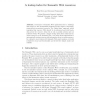138
Voted
OTM
2007
Springer
15 years 8 months ago
2007
Springer
Semantic Business Process Management (SBPM) has been proposed as an extension of BPM with Semantic Web and Semantic Web Services (SWS) technologies in order to increase and enhance...
102
click to vote
KI
2007
Springer
15 years 8 months ago
2007
Springer
Information visualisation benefits from the Semantic Web: multimodal mobile interfaces to the Semantic Web offer access to complex knowledge and information structures. Natural l...
129
click to vote
KES
2007
Springer
15 years 8 months ago
2007
Springer
Abstract. This work presents a clustering method which can be applied to relational knowledge bases. Namely, it can be used to discover interesting groupings of semantically annota...
145
Voted
ICWE
2007
Springer
15 years 8 months ago
2007
Springer
Abstract. Search engines are becoming such an easy way to find textual resources that we wish to use them also for multimedia content; however, syntactic techniques, even if promi...
118
Voted
ICLP
2007
Springer
15 years 8 months ago
2007
Springer
This article describes the experiences developing a Semantic Web application entirely in Prolog. The application, a demonstrator that provides access to multiple art collections an...
119
Voted
ICCS
2007
Springer
15 years 8 months ago
2007
Springer
Abstract. Conceptual Structures is a field of research which shares abstract concepts and interests with recent work on knowledge representation for the Semantic Web. However, whi...
109
Voted
ESWS
2007
Springer
15 years 8 months ago
2007
Springer
The RDF Book Mashup demonstrates how Web 2.0 data sources like Amazon, Google and Yahoo can be integrated into the Semantic Web. Following the principles of linked data, the RDF Bo...
87
Voted
ESWS
2007
Springer
15 years 8 months ago
2007
Springer
Developers of Semantic Web applications face a challenge with respect to the decentralised publication model: where to find statements about encountered resources. The “linked d...
118
Voted
ESWS
2007
Springer
15 years 8 months ago
2007
Springer
Since online Semantic Web applications are based on existing Web infrastructure, developing these applications could leverage experiences with and infrastructure of existing framew...
104
Voted
ESWS
2007
Springer
15 years 8 months ago
2007
Springer
We present Explorative Debugging as a novel debugging paradigm for rule based languages. Explorative Debugging allows truly declarative debugging of rules and is well suited to sup...





